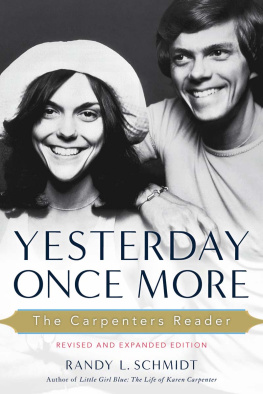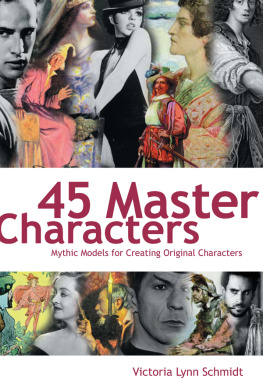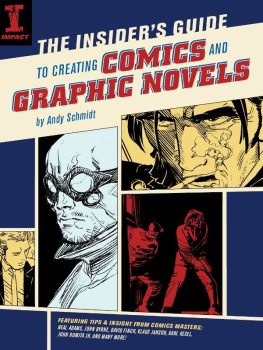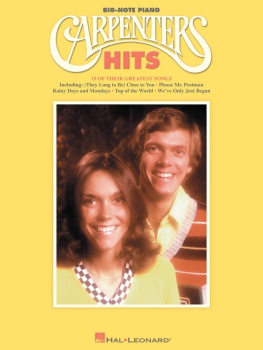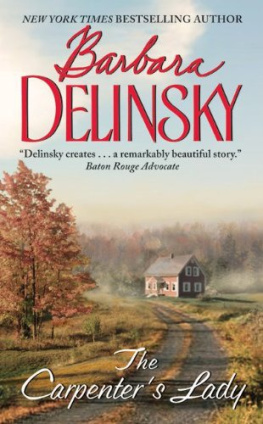
Copyright 2000, 2012 by Randy L. Schmidt
All rights reserved
Foreword copyright 2012 by Daniel J. Levitin
All rights reserved
Second edition
Published by Chicago Review Press, Incorporated
814 North Franklin Street
Chicago, Illinois 60610
ISBN 978-1-61374-414-7
A list of credits and copyright notices for the individual pieces in this collection can be found on
Cover design: Monica Baziuk
Cover photograph: The Carpenters, shot by Annie Leibovitz for Rolling Stone, Downey, California, May 1974 (Michael Ochs Archives/Getty Images)
Interior design: PerfecType, Nashville, TN
Library of Congress Cataloging-in-Publication Data
Yesterday once more : the Carpenters reader / edited by Randy L. Schmidt ; foreword by Daniel J. Levitin. 2nd ed.
p. cm.
Articles, interviews, essays, and reviews originally published 19712000.
Discography: p.
Videography: p.
Includes index.
ISBN 978-1-61374-414-7 (pbk.)
1. Carpenters (Musical group) 2. SingersUnited StatesBiography. I. Schmidt, Randy (Randy L.)
ML421.C28Y47 2012
782.421640922dc23
2012019681
Printed in the United States of America
5 4 3 2 1
To Frank Bonito, my new friend, trusted advisor, and advocate.

To Frank Pooler, the multitalented choir genius and man I greatly admire as a fellow music educator, mentor, and friend.

To Evelyn L. Wallace, longtime Carpenters secretary, on behalf of many who cherish the years of correspondence and friendship.
CONTENTS
FOREWORD
I n the summer of 1970, as the Beatles The Long and Winding Road (backed with For You Blue) tumbled from the top five, and just two months after the Kent State murders, Close to You reached number one on the American charts. The Carpenters sprang up in an era of protest songs and antiwar demonstrations with a repertoire composed primarily of love songs. (Were they the only ones heeding the musical advice of the newly disbanded Beatles, that all you need is love?) Though many songs from that time now sound dated because of their political messages or gimmicky use of instruments, the Carpenters songs still sound fresh today.
Between 1969 and 1982, the Carpenters released an average of one album per year. With over 100 million records sold worldwide, they are among the top-selling musical groups of all time. In the summer of 1971, Karen and Richard hosted their own variety series on NBC, Make Your Own Kind of Music. They toured internationally throughout the 70s, and their 1976 tour of Japan was the largest-grossing tour in the country up to that point. The rapid and vast commercial success of the Carpenters catapulted A&M Records from a small middle-of-the-road label to a major radio force, ushered in a new era of signings at A&M, and bankrolled a number of artists, including the Police, Bryan Adams, and Supertramp.
When Supertramp first went out on the road, Richard Carpenter recalled, the head of marketing for A&M UK said to them, Whatever god you believe in, bow down to him before your shows and thank him for the Carpentersbecause, without them, you wouldnt be here.
The Carpenters were an anomalyat once anachronistic, hearkening back to the golden age of Tin Pan Alley, and also ahead of their time. Richard has been credited with inventing the power rock ballad (Goodbye to Love), and their music has influenced generations of artists from Madonna and k. d. lang to Sonic Youth and Chrissie Hynde of the Pretenders. Their songs are considered true pop standardsId be willing to wager that (They Long to Be) Close to You and Weve Only Just Begun have been performed at more weddings than any other songs. More recently, the two songs were inducted into the Grammy Hall of Fame.
One reason the music of the Carpenters has endured is because it was never trendy, never tried to be anything it wasnt, and ultimately because it strikes the right balance between immediate familiarity (it draws you in) and rich complexity (it keeps you coming back for more). Then there are Karen and Richard themselves. Karen had one of the purest and most perfect voices in the history of recorded popular music; Richards soaring talent as an arranger and producer places him among the most highly respected musicians in recording history.
The first thing one hears is the Voice. Its instantly recognizable. Karen possessed that rare quality shared by great singers. Consider Frank Sinatra, Ella Fitzgerald, Perry Comowithin hearing one note, you can make no mistake about who is singing nor confuse the voice with that of anyone else. And, like Perry Como, Karen sings with a clarity so free from artifice or affectation that no one can imitate it. I think that one of the reasons theyve endured for so many decades is because of the emotional depth and complexity that Karen brings to the songs. With just a few words, she can eloquently capture the contradictions of human emotional life. Theres a world-weariness in her voice when she sings hangin around in the opening verse of Rainy Days and Mondays. You believe that she really has nothing to do, nowhere to go, and no one to be with. But there is no sense of self-pity in Karen, no stark depression lingering beneath the wordswe understand that the state is temporary. The gift of her singing is that she can sing about being sad and make us feel uplifted. Were not happy that the singer was jilted in Superstar (Dont you remember you told me you loved me, baby), but the performance of the song is so beautiful that it makes us feel happy.
Even with a great voice, a singer goes nowhere without the right song and the right arrangement of that song. What has been well-known throughout the music industry for four decades, yet generally unknown to the public, is the real secret of the Carpenters career: Richard Carpenter. Richard worked tirelessly behind the scenes to select the material for the group, often recording songs that other industry pundits had turned down or ignored and bringing those songs to the top of the charts. When he couldnt find suitable material for his sister, Richard wrote songs for her that ended up becoming some of the groups biggest hits, including Only Yesterday, Yesterday Once More, and Top of the World. On more than one occasion, he butted heads with record-company executives, insisting that he knew how to make a hit record and choose hit singles. In these disagreements, Richard was always right. Always. In recognition of his arranging skills, he has been nominated for a Grammy five times.
Richard is pleased with, and perhaps a bit surprised by, their longevity. Our music seems to hold up very wellwere at 100 million units worldwideand theyre still selling in large numbers. The critics who dismiss us must not be getting it. Someone is buying those albums.
Since Karens unexpected death in 1983, Richard has remained relatively active, releasing a solo albumTimein 1987 on A&M and another in 1996, Richard Carpenter: Pianist, Arranger, Composer, Conductor. He served as executive producer for the 1989 television movie The Karen Carpenter Story, which painted a stark and honest picture of the siblings personal lives, the often strained relationship with their parents, and Karens struggle with anorexia.
The Carpenters have remained one of the most popular bands in Japan across the last two decades. In 1995, we did a Japanese release,

